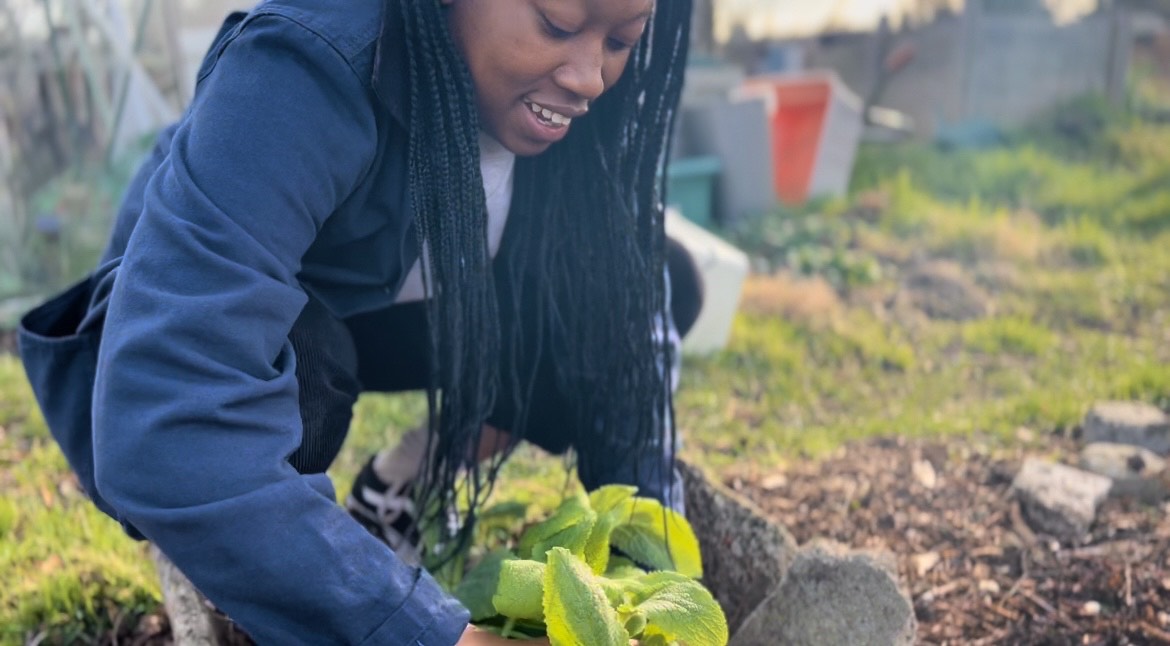Can allotments save Britain’s neglected communities?
With food insecurity on the rise, and a lack of access to outdoor spaces for marginalised groups, are allotments the answer?
J'Nae Phillips
25 Feb 2022

Still via Arlette - gal-dem
Throughout the pandemic, the demand for allotments soared in British cities as people craved outdoor space, a chance to socialise in an acceptable way, practice a new hobby, and find refuge from being confined within the borders of their own homes. An allotment is a plot of land that individuals can rent to grow fruit, vegetables and plants – there are around 330,000 in the UK – most of which are run by local councils and charities.
Allotments tend to have long waiting lists – up to 18 months in some areas – and according to the National Allotment Society, 40% of councils saw a ‘significant uplift‘ in people joining waiting lists during April 2020. Pandemic demand has meant more Britons are signing up for a space to grow food, despite lists sometimes being 90,000 names long. But why do people want access to an allotment, and why now?
“A real determination to grow my own food for my family has led me to find solutions,” says Hema Mistry, who grows a variety of fruits, vegetables and edible plants in her North West London back garden and documents her journey on Instagram @growwithhema. “Organic homegrown produce has meant less shopping, healthier meals and fresh ingredients, which are just a step away from my back door.”
It’s widely known that food landscapes in urban environments can be bleak. Cheap fast food is everywhere, and fresh, easily accessible and affordable produce is scarce. These dismal and dreary realities drive health and hunger-related issues, widening the food divide for underserved communities. With food insecurity affecting thousands of families – food banks in the UK saw an 88% rise in usage during the pandemic, and with a 62% rise in emergency food parcel distribution in October 2020 compared with the previous year – it’s easy to see why allotments are growing in popularity as they offer access to fresh food alternatives in space-deprived neighbourhoods.
“Organic homegrown produce has meant less shopping, healthier meals and fresh ingredients, which are just a step away from my back door”
Hema Mistry
Daniel Opoku-Baah from South London uses his allotment to grow food for his restaurant Drums & Flats, which he founded with his childhood friend. He’s promoting “diversity in gardening” on his Instagram account @rookiegreenie_allotment. “One of my best friends and I started our restaurant a couple of years before I got my allotment space, so the allotment [now] reflects our existing culinary style. We serve ‘South London Soulfood’, food big on flavour, herbs and seasonings. I’m growing the type of stuff I already enjoy eating.”
The pandemic exposed what many marginalised people in Britain already knew; there are gaping holes in the UK’s food safety net and many communities have little or no access to fresh fruit and vegetable options that are nutrient-rich and good for physical as well as mental wellbeing. Amid a growing desire to be more self-sufficient and curb food insecurity, inclusive allotments offer people living in underserved areas a chance to change their culinary habits by becoming food producers. “I do think being unapologetic about who I am and the culture I come from is helping to diversify the field,” says Daniel, “there is still a long way to go but we are beginning to see a more diverse range of people getting involved in gardening.”
With the popularity growing, women-run allotments are on the rise. It’s estimated that two-thirds of allotment plot holders in London are women, and across Britain. Even though the interest is there, many women allotmenteers still struggle to find a plot and access these urban landscapes. “I’m conscious that I am just one person, someone who has been lucky to get an allotment, especially in London,” says Vimbai Dzimwasha, who shares her allotment on Instagram @allotmentbabes.
While allotments today are becoming more inclusive in terms of gender, people from ethnic minorities still struggle to access green spaces compared to their white counterparts. But having allotmenteers from all walks of life, could offer an answer to diversity issues within the food landscape. “It’s important I diversify what I grow too,” says Cherelle Farrell from @thejoyofstayingin, who has a small allotment plot in Lancashire. “I’m very interested to see which ‘exotic’ produce can be grown in England. I’ve definitely seen more over the last couple of years on platforms like Instagram.”
Growing food in community-based ways – like with allotments – gives underserved citizens a chance to fight back against the many forms of injustice they experience at the hands of prejudiced food systems. Cherelle feels that growing food is an important part of people’s culture, and “isn’t a novelty lockdown trend”. As allotments grow in popularity in the UK, these produce destinations can take back control and challenge corporate food markets that are less concerned by community wants and needs. “A lot of what is produced by corporate [food] systems tends to be varieties of what is commercially viable, rather than what is needed or good for the community’s health and wellbeing,” says Hema.
“It’s a tough task to uplift an entire community where the barriers or factors that cause disparities aren’t necessarily caused by us”
Vimbai Dzimwasha
By welcoming people from marginalised groups, allotments can uplift communities impacted by health and wealth disparities, and challenge the lingering perception that allotments are a largely White environment. “It’s a tough task to uplift an entire community where the barriers or factors that cause disparities aren’t necessarily caused by us,” says Vimbai, “the real drive for change has to come from the people who have benefited from the status quo.”
Typically, allotments are associated with an older demographic. But as younger generations are beginning to take a keen interest in all things outdoors – 43% of under 40s grow their own vegetables compared to 32% of over 60s – the ‘old boys club’ allotment stereotype is changing. “People typically hold on to allotments for years, so the opportunities to introduce a more diverse range of plot holders is a slow process,” Daniel explains, “this is why it’s important to highlight having an allotment is for absolutely anyone, no matter who you are.”
A lack of government assistance has led people to cultivate their own fresh food solutions, choosing to grow their own produce as an alternative way to source food. Allotments run by people from minority backgrounds can uplift overlooked and vulnerable communities by giving them equal access to fresh food and nature that those from more privileged backgrounds get to enjoy with relative ease. By creating positive food experiences for a greater portion of society, can set a precedent for who can grow food in what ways. “Growing your own food should be a norm in society, not a privilege,” says Hema. Can allotments and urban gardens save Britain’s food landscape?
Like what you’re reading? Our groundbreaking journalism relies on the crucial support of a community of gal-dem members. We would not be able to continue to hold truth to power in this industry without them, and you can support us from £5 per month – less than a weekly coffee.
Our members get exclusive access to events, discounts from independent brands, newsletters from our editors, quarterly gifts, print magazines, and so much more!





